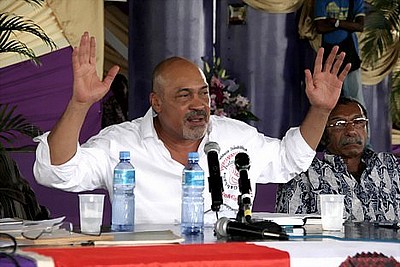By Ricardo Zamora
Impunity Watch Reporter, South America
RIOHACHA, Colombia – Another human rights activist was gunned down last week week, the latest murder in the ongoing struggle between human rights supporters and guerilla groups. Human rights groups are urging Colombia to be more proactive in protecting activists and in prosecuting and punishing those responsible for this and other crimes against humanity.
Luis Alfredo Socarras Pimienta, a local dentist, dental-care campaign organizer, leader of the Wayuu indigenous people, and human rights activist was gunned down last Friday in the doorway of his home. The unidentified gunman reportedly fled the scene after the shots were fired.
Over the past year, Pimienta had organized several demonstrations to protest the human rights violations and egregious living conditions the Wayuu people were subjected to. The Wayuu people used the demonstrations to urge the Colombian government to respect their human rights and assist them in obtaining a better quality of life.
During the year Pimienta also ran for the position of mayor of the Manaure municipality and for a position on the Polo Democratico Alternativo party.
The Inter-American Commission on Human Rights (IACHR) reports that Pimienta was widely recognized as a human rights activist and indigenous leader of the Wayuu poeple. The Commission explained that “attacks against leaders break down the cohesion of indigenous people when it comes to defending their human rights, and undermines their sociocultural integrity” and “that the work of human rights defenders is an essential component in building a solid and lasting democracy.”
In short, the IACHR says that it urges the State to protect activists because a leader’s removal essentially disintegrates the cohesion, and therefore the voice, of prejudiced groups, whether indigenous peoples or otherwise.
Guerilla groups and others opposing the movement for human equality thrive by capitalizing on the weakness of the individual. Without leaders such a Pimienta, indigenous groups cease to have a collective voice, leaving only the voices of independent and unintegrated individuals which are unlikely to be heard or understood by local or federal governments.
Created by the Organization of American States (OAS), the IACHR is an independent panel consisting of seven independent members equally representing its 35 member nations. It assists in unifying the voices of victims of human rights violations.
For more information please see:
CNN – OAS Human Rights Commission Condemns Colombian Activist’s Slaying – August 2, 2010
Colombia Reports – OAS Body Condemns Murder of Indigenous Leader – August 2, 2010
Indigenous Peoples Issues & Resources – IACHR Condemns Murder of Human Rights Defender of Wayuu People in Colombia – August 2, 2010


